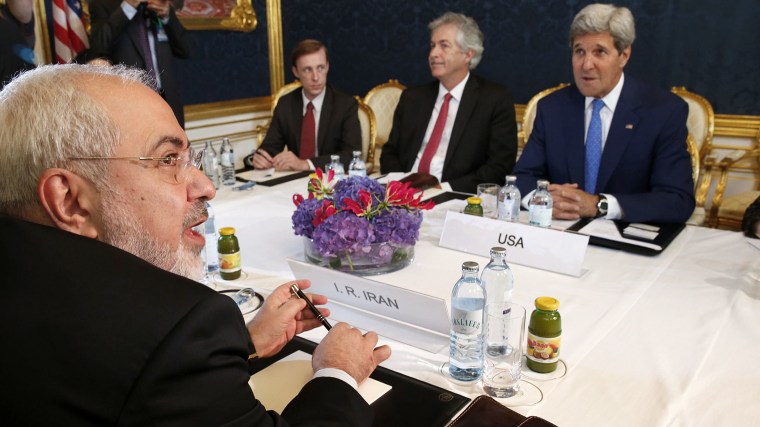In a practical sense, when congressional Republicans invited Israeli Prime Minister Benjamin Netanyahu to deliver a joint-session address, it was part of a larger sabotage campaign. GOP lawmakers, without so much as a hint of embarrassment, are openly trying to derail international diplomatic talks with Iran, and Republicans had no qualms about partnering with a foreign government to undermine American foreign policy.
The GOP gambit arguably marked a new low. But after hitting the bottom of the barrel, Republicans dug a hole and
fell just a little further.
A group of 47 Republican senators has written an open letter to Iran's leaders warning them that any nuclear deal they sign with President Barack Obama's administration won't last after Obama leaves office. [...] "It has come to our attention while observing your nuclear negotiations with our government that you may not fully understand our constitutional system.... Anything not approved by Congress is a mere executive agreement," the senators wrote. "The next president could revoke such an executive agreement with the stroke of a pen and future Congresses could modify the terms of the agreement at any time."
Josh Rogin's
report makes clear that the signatories "hope that by pointing out the long-term fragility of a deal with no congressional approval ... the Iranian regime might be convinced to think twice" about striking a deal with Americans and our negotiating partners.
The letter was organized by Sen. Tom Cotton (R-Ark.), a right-wing freshman who
has spent months bragging about his hopes of destroying
any diplomatic agreement intended to stop Iran's nuclear ambitions.
The list of the 47 GOP senators who signed on to the letter is online
here. Note, that list features several presidential hopefuls, including Ted Cruz, Rand Paul, and Marco Rubio. (Only seven Senate Republicans decided not to endorse the letter: Lamar Alexander, Dan Coats, Thad Cochran, Susan Collins, Bob Corker, Jeff Flake, and Lisa Murkowski.)
Norm Ornstein noted this morning that he's "
flabbergasted" by the "astonishing breach of conduct." That's clearly the appropriate response. But I'm also struck by how dangerous the Republicans' conduct is.
As we
discussed back in January, when the broader sabotage campaign came into focus, there is no real precedent for this in the American tradition. The U.S. system just isn't supposed to work this way – because it can't. Max Fisher
explained that we're looking at "a very real problem for American foreign policy."
The Supreme Court has codified into law the idea that only the president is allowed to make foreign policy, and not Congress, because if there are two branches of government setting foreign policy then America effectively has two foreign policies. The idea is that the US government needs to be a single unified entity on the world stage in order to conduct effective foreign policy. Letting the president and Congress independently set their own foreign policies would lead to chaos. It would be extremely confusing for foreign leaders, and foreign publics, who don't always understand how domestic American politics work, and could very easily misread which of the two branches is actually setting the agenda.
The United States and our allies have reached a delicate stage of diplomacy on a key issue, but as far as congressional Republicans are concerned, the United States isn't really at the negotiating table at all -- the Obama administration is. Republican lawmakers not only disapprove of the process, they also feel justified conducting their own parallel, freelance foreign policy, which includes partnering with foreign governments and sending a message to the very rival the United States and our allies are negotiating with.
In other words, for the first time anyone can remember, we're watching American elected officials brazenly trying to sabotage American foreign policy.
Under the circumstances, it's no longer ridiculous to wonder whether GOP lawmakers are violating
the Logan Act.
As for the GOP's legal argument to Tehran, Jack Goldsmith
added, "It appears from the letter that the Senators do not understand our constitutional system or the power to make binding agreements."
Unfortunately, that's not the only thing they fail to understand. They seem equally confused about propriety, U.S. protocols, and how American foreign policy is supposed to work.
